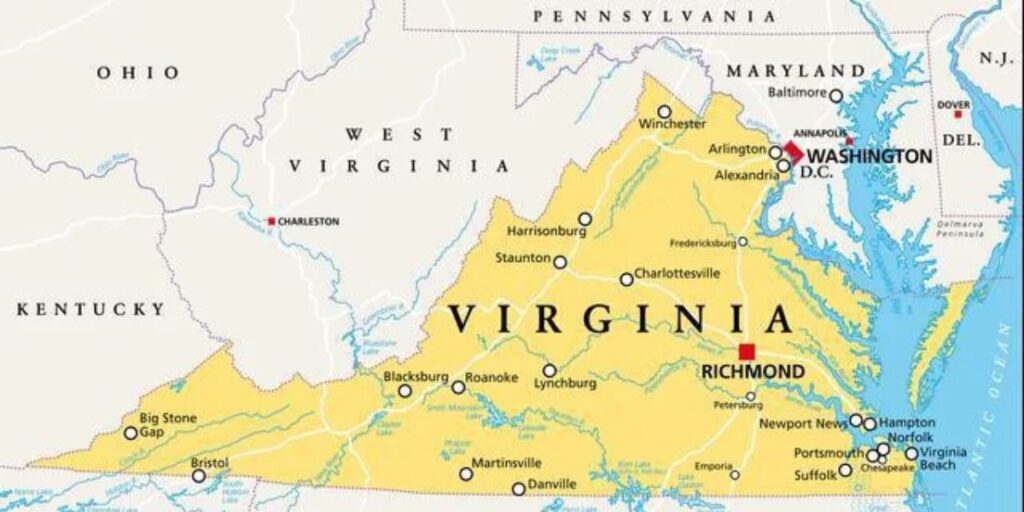Virginia is a state rich in history, military presence, natural beauty, and economic growth. From its Atlantic coastline to its mountainous interior, the Commonwealth is home to cities that offer diverse lifestyles and industries.
Whether you’re looking to relocate, visit, or just learn more about the state, here’s an updated guide to the largest cities in Virginia by population as of 2025, along with what makes each one unique.
Top 10 Largest Cities in Virginia (By Population)
| Rank | City | Estimated Population (2025) | Region |
|---|---|---|---|
| 1 | Virginia Beach | 455,000+ | Coastal / Hampton Roads |
| 2 | Chesapeake | 255,000+ | Hampton Roads |
| 3 | Norfolk | 245,000+ | Hampton Roads |
| 4 | Richmond | 235,000+ | Central Virginia |
| 5 | Arlington | 240,000+ | Northern Virginia (D.C. Metro) |
| 6 | Newport News | 185,000+ | Hampton Roads |
| 7 | Alexandria | 160,000+ | Northern Virginia (D.C. Metro) |
| 8 | Hampton | 135,000+ | Hampton Roads |
| 9 | Roanoke | 100,000+ | Western Virginia |
| 10 | Portsmouth | 95,000+ | Hampton Roads |
Virginia Beach
Region: Coastal / Hampton Roads
Virginia Beach is Virginia’s most populous city, known for its resort-style atmosphere, miles of beaches, and iconic boardwalk. It’s also home to major military bases like NAS Oceana, and attracts tourists year-round. With strong schools and a family-friendly environment, it’s consistently ranked as one of the best places to live on the East Coast.
Chesapeake
Region: Hampton Roads
Chesapeake blends urban convenience with rural charm. It’s one of the fastest-growing cities in Virginia, known for Great Dismal Swamp National Wildlife Refuge, highly rated schools, and a strong housing market. The city is attractive to both families and military personnel due to its proximity to major bases.
Norfolk
Region: Hampton Roads
Home to the largest naval base in the world (Naval Station Norfolk), this historic port city is a hub of military activity, arts, and culture. Norfolk also features Old Dominion University, a revitalized downtown area, the Chrysler Museum of Art, and a growing foodie scene.
Richmond
Region: Central Virginia
As Virginia’s capital city, Richmond has a mix of history, politics, and innovation. Known for Civil War landmarks and cobblestone streets, it’s also a growing center for law, finance, startups, and the arts. The city’s James River Park System offers outdoor adventure within city limits.
Arlington
Region: Northern Virginia / D.C. Metro
Though officially a county, Arlington functions like a dense, urban city. It’s home to The Pentagon, Arlington National Cemetery, and numerous federal agencies. With access to Washington, D.C., excellent public transportation (Metro), and top-rated schools, Arlington is one of the most affluent and educated areas in the U.S.
Newport News
Region: Hampton Roads
Newport News is an important center for shipbuilding and aerospace. It houses Huntington Ingalls Industries, the largest military shipbuilding company in the U.S. The city also has beautiful waterfront parks, museums, and a strong presence of military families due to nearby bases.
Alexandria
Region: Northern Virginia / D.C. Metro
This historic city on the Potomac River is known for Old Town Alexandria, with its cobblestone streets, boutiques, and colonial-era buildings. Alexandria has a strong economy, diverse culture, and is a commuter-friendly city due to its close proximity to D.C.
Hampton
Region: Hampton Roads
Hampton boasts deep historical roots, being one of the oldest cities in the U.S. It’s home to NASA Langley Research Center and Langley Air Force Base. With a scenic harbor and growing cultural attractions, Hampton is also popular with families and military personnel.
Roanoke
Region: Western Virginia
Nicknamed the “Star City of the South” for its iconic illuminated star, Roanoke is a hub for healthcare, education, and outdoor recreation. Nestled in the Blue Ridge Mountains, it’s a gateway to the Appalachian Trail and the Blue Ridge Parkway. It also has a growing arts scene and a revitalized downtown.
Portsmouth
Region: Hampton Roads
With deep naval ties and historic charm, Portsmouth features a vibrant waterfront, preserved 19th-century neighborhoods, and the Children’s Museum of Virginia. It has easy access to the larger metro area and continues to attract residents with its affordability and sense of community.
Final Thoughts
Virginia’s largest cities reflect the state’s diverse character—from coastal navy hubs and suburban D.C. metros to mountain communities rich in culture and adventure. Each city offers its own lifestyle, economy, and cultural experiences, making the Commonwealth a state full of vibrant urban centers and growing opportunities.
Whether you’re planning to relocate, invest, or explore, these cities provide a compelling mix of history, modern amenities, and a high quality of life.




More Stories
Largest Cities in Virginia Revealed: 2025 Population and Key Stats
Largest Cities in Virginia Revealed: 2025 Population and Key Stats
Largest Cities in Virginia Revealed: 2025 Population and Key Stats